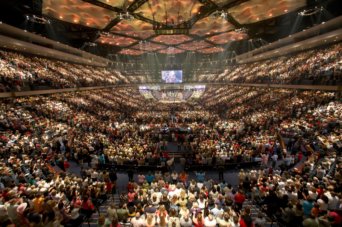- About
- Topics
- Picks
- Audio
- Story
- In-Depth
- Opinion
- News
- Donate
-
Signup for our newsletterOur Editors' Best Picks.Send
Read, Debate: Engage.

| located: | Nigeria |
|---|---|
| editor: | Shira Jeczmien |
While churches in the global north are in a ceaseless decline, their African counterparts are flourishing into what is now referred to as the modern megachurch. Adopting a likened ethos to that of the American-exported evangelism, pentecostal churches are sprouting across many African countries, quickly becoming one of the continent’s most lucrative and unregulated economy.
Each year, millions of dollars are exchanged in these business-modelled houses of devotion. Nigeria, Uganda and Ghana are now home to churches that can hold up to 200,000 devotees, making the business of God a significant segment of the countries’ economies as they both employ and house by the thousands.
Converting religious worship into significantly positive cash flow has played a major role in almost all religious institutions, but thriving from a failed government is what makes these megachurches so rife in countries such as Nigeria. These churches not only capitalise on belief, they also work within important social sectors systematically neglected by the state. This kind of social work, coined as “social gospel” makes “the modern African church promise a life that is abundant and prosperous – both spiritually and materially.” Reports the Quarts Africa journal.
Following in the shady footsteps of many of Nigeria’s powerful sectors, namely oil and electricity, precisely how much of Nigeria’s GDP is attributed to the modern church remains unclear. “At least six church leaders have private jets, so they have money. How much? No one really knows.” Says economist and CEO of Lagos consultancy Financial Derivatives, Bismarck Rewane. “They don’t submit accounts to anybody.”
Operating under a charity statues, the churches are completely exempt from tax, and furthermore, have no obligation to publicise their accounts. And while there’s been growing dispute over this law in Nigeria – a country still torn by growing poverty and famine – the stronghold of Christianity is currently at 70% of the country’s 170 million citizens, allowing the church to continue its free reign.
Economics aside, the megachurches are also teaching a gospel belonging to a very specific ideal of masculinity and family life, spreading damaging misogynistic rhetoric in a country already struggling with gender inequality.
Not conforming to the limiting schedule of Sunday mass and mid-week services, the churches have adopted, improved and revised their preach across all imaginable media outlets. From radio shows and TV, to books, YouTube channels and international branches. Religion too has attuned itself to neo-liberal tactics of audience outreach and exponential growth strategies.
Jumping off the back of a failed government, the pentecostal churches in Africa have deformed from a socially motivated premise to yet another self-serving entity, aiding a select few, and not the many. Unregulated economies have once again proved their power to sway forces of good and bad alike, and in Nigeria at least, a governance held by regulations is still nowhere to be seen.